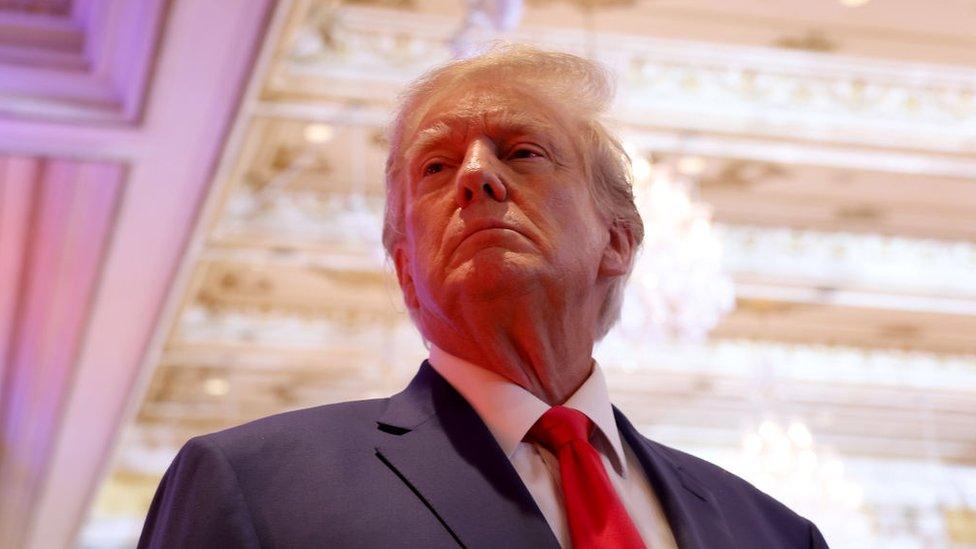First 100 days: Where President Trump stands on key issues
- Published
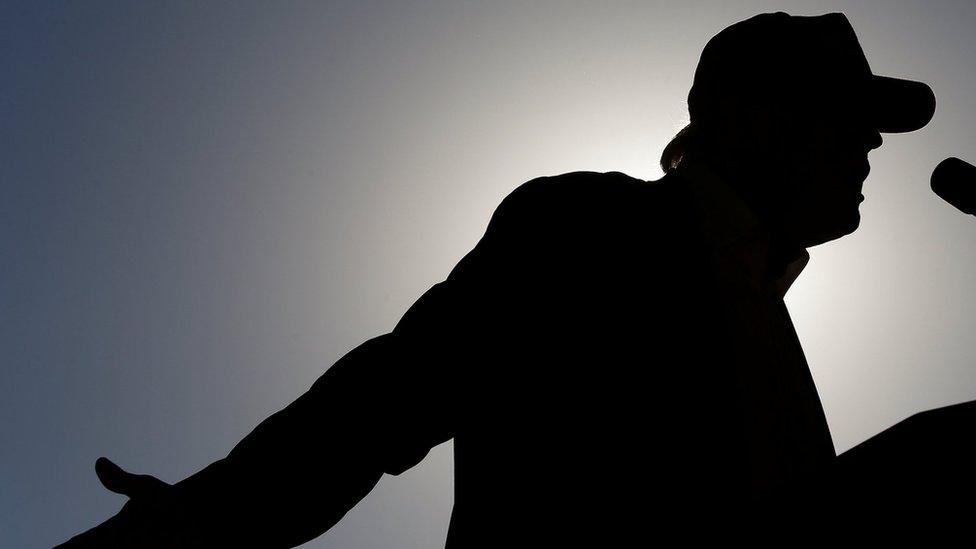
President Donald Trump has wasted little time in shaking up how things are done in Washington - for better or worse - in his first few months in office.
Six months into his first term, questions about what the Republican might do with his power are finally being answered.
From travel bans and border immigration plans to climate change and public safety, here is where he stands on key issues.

TAXES
Mr Trump has promised the biggest tax cuts since the Ronald Reagan era. He has pledged reductions across-the-board, promising working and middle-income Americans "massive" cuts. His plan includes reducing the number of tax brackets from seven to three, cutting corporate taxes, eliminating the estate tax and increasing the standard deduction for individual filers.
According to one analysis, external, the top 1% of earners would see their income increase by double-digits, while the bottom quarter gets a boost of up to 1.9%. But the Center for a Responsible Budget has also warned his plan would balloon the national debt.
Attempts to tackle tax reform have been delayed due to the stalled healthcare bill.

JOB CREATION
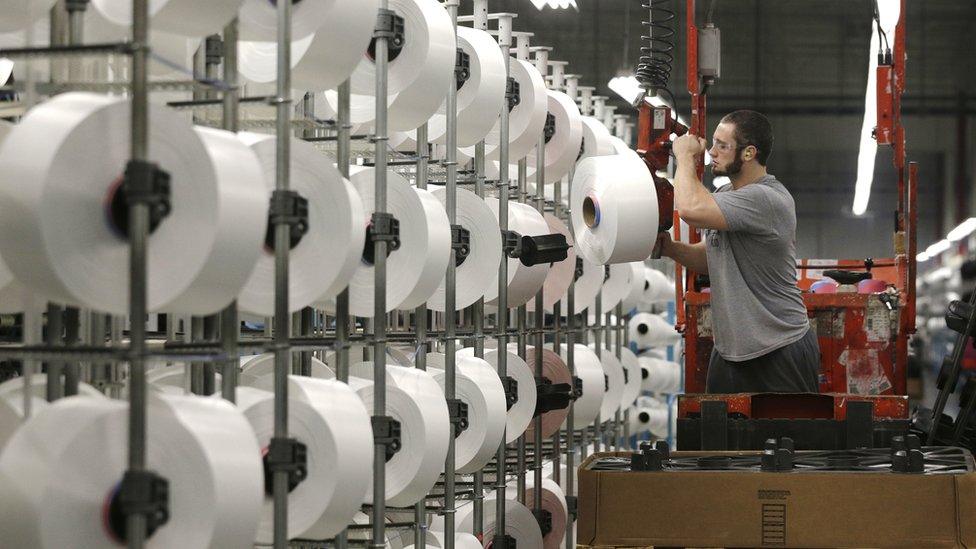
Donald Trump wants to reverse the trend of manufacturing jobs going overseas
Mr Trump says he will create 25 million jobs over 10 years, saying too many jobs, especially in manufacturing, are being lost to other countries. He plans to reduce the US corporate tax rate to 15% from the current rate of 35%, and suggests that investing in infrastructure, cutting the trade deficit, lowering taxes and removing regulations will boost job creation.
On his first full workday in office, he told business leaders that he seeks to cut business regulations by 75%, and create a "border tax" for companies that leave the country and sell their products back to the US.

IMMIGRATION
This is his signature issue. Despite critics who call it unaffordable and unrealistic, the Republican has stood by his call to build an impenetrable wall along the 2,000-plus-mile US-Mexico border.
In his first days in office, Mr Trump signed a pair of executive orders designed to fulfil that campaign promise.
One order declares that the US will create "a contiguous, physical wall or other similarly secure, contiguous, and impassable physical barrier".
The second order pledges to hire 10,000 more immigration officers, and to revoke federal grant money from so-called "sanctuary cities" which refuse to deport undocumented immigrants.
It remains to be seen how Mr Trump will pay for the wall, although he has repeatedly insisted that the US would recoup the costs from the Mexican government, despite their leaders saying otherwise.
The border wall is likely to face a funding setback, after Republican lawmakers suggested money for the project would not be included in an upcoming spending bill.
Mr Trump had proposed $1.5bn (£1.2bn) for his wall through Congress as part of a spending bill, which funds federal agencies to the end of the current fiscal year.
The bill must be approved by 28 April to avoid a partial government shutdown.
But Senator Roy Blunt, a member of Republican leadership, said that Mr Trump's supplemental funding could be dealt with "at a later time".

REFUGEES
Mr Trump has been warning that the US policy of admitting refugees from certain regions - the Middle East or, more generally, Muslim nations - presents a serious threat to US national security.
He has called for the US to suspend resettling refugees until "extreme vetting" procedures can be implemented, including ideological tests to screen out extremists.
Two attempts by Mr Trump to introduce bans on all refugees and travellers from some Muslim-majority countries were blocked by the courts.
But in June, the Supreme Court allowed a limited version of his second ban to come into force, banning refugees temporarily unless they have a "credible claim of a bona fide relationship with a person or entity" in the country.
Visitors from Iran, Libya, Somalia, Sudan, Syria and Yemen will also be unable to get visas unless they can demonstrate US ties.

FOREIGN POLICY
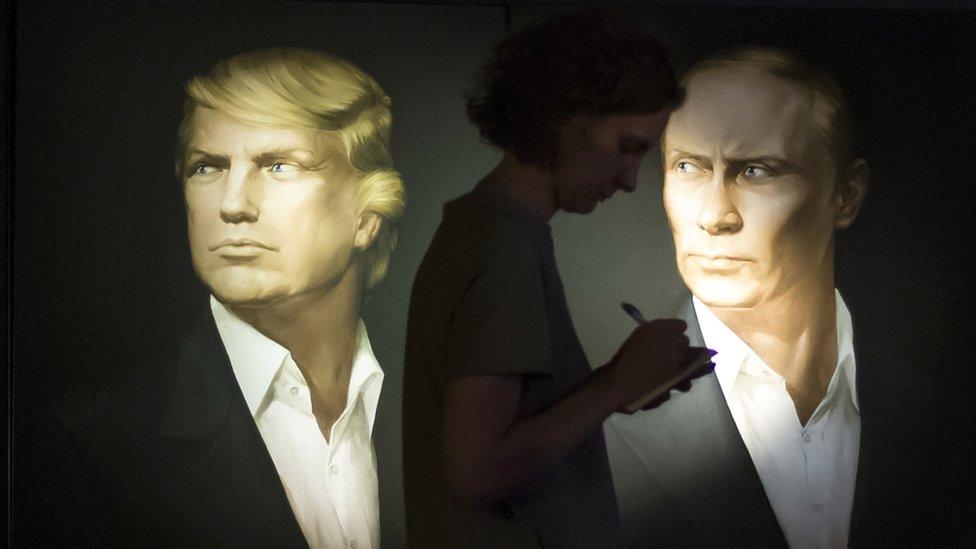
Portraits in a Moscow pub - would US-Russia ties improve under a Trump presidency?
Mr Trump has made a dramatic shift in foreign policy, breaking from the "America First" agenda he promised during the presidential campaign.
He bombed a Syrian air base in response to a suspected chemical weapons attack on a rebel-held town.
The US military then dropped a 21,600lb (9,800kg) bomb on a tunnel complex used by Islamic State militants in Afghanistan.
Mr Trump has taken a hard-line stance towards combating IS and has even at times asserted the US should commit tens of thousands of ground troops to the fight.
He professed support for Nato after previously calling the alliance "obsolete" and said it should do more to combat terrorism in the Middle East, maintaining that US allies should spend more on their own protection.
Tensions have also escalated on the Korean peninsula, where American military has ordered a navy strike group amid heated rhetoric from both the US and North Korea
Pyongyang marked the 105th birthday of the nation's founding president, Kim Il-sung, with a huge military parade before conducting a failed rocket test.
On the eve of the G20 summit in Germany, he warned of "severe consequences" following the country's long-range missile test.
Relations with China have soured over the belligerence of North Korea, and a US arms deal with Taiwan.
Meanwhile, the Trump administration has said it was launching a review of whether lifting sanctions against Iran was in the US's national security interests, but acknowledged Tehran was compliant with the historic 2015 nuclear deal.
During his presidential campaign, Mr Trump called the agreement "the worst deal ever negotiated".

TRADE DEALS
Once upon a time, Republicans were the party of unfettered free trade. Donald Trump has changed all that. While he says he is not opposed to trade in principle, any trade deals have to protect US industry.
Mr Trump signed an executive order to withdraw the US from the Trans-Pacific Partnership, which was never approved by Congress and therefore had yet to go into effect in America.
The president has said that he will re-open negotiations on already signed pacts, such as the North America Free Trade Agreement (Nafta), and withdraw if US demands are not met. He has accused US trading partners like Mexico, China and Canada of unfair trade practices, currency manipulation and intellectual property theft, threatening to unilaterally impose tariffs and other punitive measures if they do not implement reforms.
He also signed the so-called "Buy American, Hire American" executive order, which directs federal agencies to enforce government rules on excluding foreign contractors from bids for government projects.

CLIMATE CHANGE
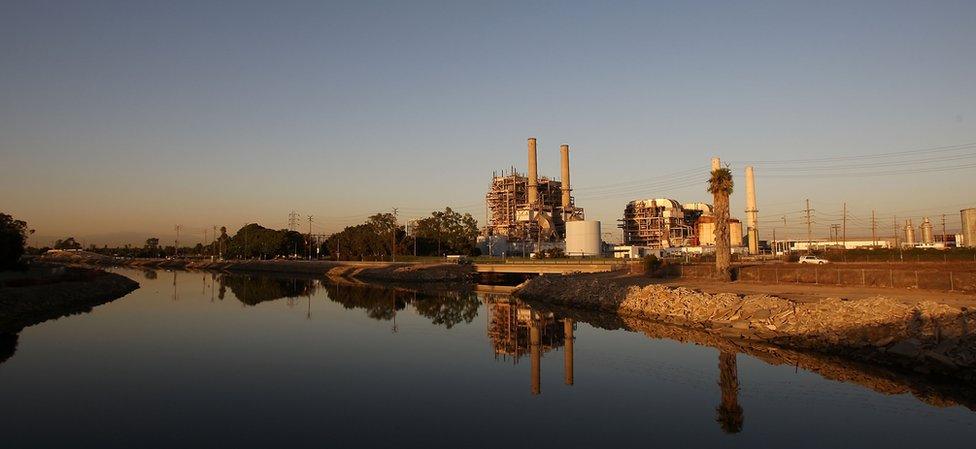
Environmental regulations have been attacked by Trump
Mr Trump caused global dismay when he pulled out of the Paris agreement, which he said would impoverish the US.
He said it would cost the US $3tn (£2.3tn) in lost GDP and 6.5 million jobs - while rival economies like China and India were treated more favourably.
US officials refused to say whether the president still maintained that climate change was a hoax.
He says he supports clean water and air, but wants to slash funding to the Environmental Protection Agency.
Signing an executive order reversing Obama-era restrictions on greenhouse gas emissions from coal and natural gas power plants, he pledged to reduce America's reliance on imported fuel and "end the war on coal".

ABORTION
The Republican said last March that abortions should be illegal and he supported "some form of punishment" for women who had them. His campaign quickly backed down from that statement, however, and asserted that the candidate believed the legality of the procedure should be left up to individual states, with any criminal penalties being reserved for abortion providers.
He has said he supports an abortion ban exception for "rape, incest and the life of the mother". He has called for defunding Planned Parenthood. As recently as 2000, Mr Trump supported abortion rights but has said that, like Ronald Reagan, he changed his views on the matter.
As one of his first actions as president, he signed an order banning federal money going to international groups which perform or provide information on abortions.
In April, he signed a bill removing an Obama-era rule that barred states from withholding federal funding for family planning services that provide abortions.
Under the new rule, state governments can decide how they want to distribute Title X funding, a Nixon-era family-planning programme, allowing some conservative states to undercut Planned Parenthood and other abortion groups.

HEALTH
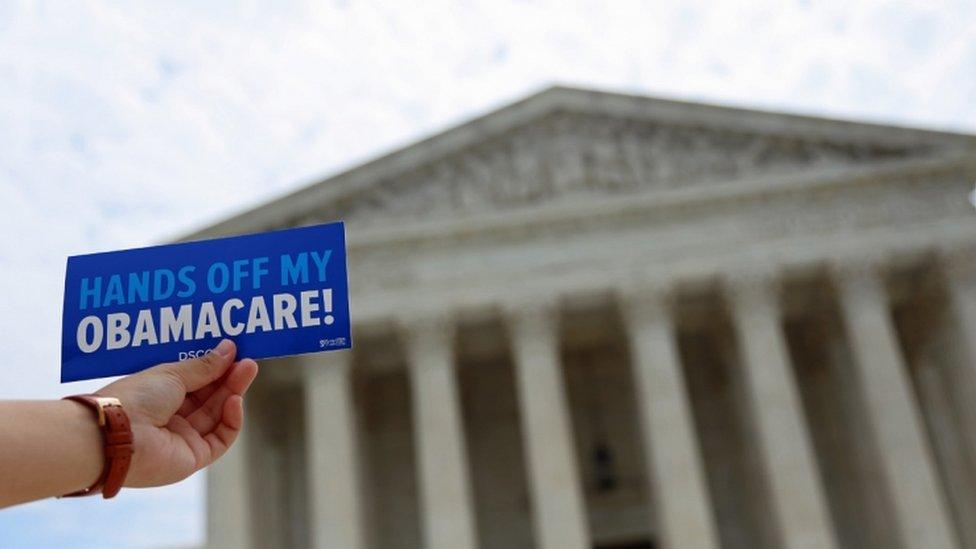
Republicans want to revoke President Obama's healthcare reforms
Obamacare is one of the outgoing president's signature policies - and Mr Trump made repealing it one of his major campaign promises.
But Republican efforts to agree an alternative appear to have stalled.
The House plan, the American Health Care Act, has been passed by the lower chamber.
But the Senate chose to rewrite their bill from scratch, and have been unable to create one with widespread support.
Senator Mitch McConnell unveiled a plan after weeks of secret discussions among a small group of senators, but it has been criticised by politicians of all hues, plus health industry bodies and hospital groups.
Some Republicans feel Medicaid cuts in the bill are too harsh, while others are unhappy that changes do not go far enough in demolishing Obamacare.
Mr Trump had promised that his replacement plan will be less expensive, providing "insurance for everybody".

LAW AND ORDER
Violence and lawlessness is out of control in the US, according to Mr Trump. He says law enforcement agencies are unable to fight crime because of runaway "political correctness" and says they should be allowed to get tough on offenders. He says police profiling is necessary to prevent terrorist attacks on US soil.
He supports "stop and frisk", claiming the policy was highly successful in New York, even though many experts disagree. The practice was ruled unconstitutional and a form of "indirect racial profiling" by a federal judge in the city.

CHILDCARE
Rejecting Republican orthodoxy, Mr Trump has called for six weeks of paid maternity leave, which would amount to what the mother would receive in unemployment benefit. But this would not apply to fathers. There are no details though on how this policy would be paid for.

GUN LAWS
He has blamed some shootings on lax gun laws, saying armed people could have intervened and saved lives. He frequently accused his former rival Hillary Clinton of wanting to eliminate gun rights during the campaign and promises his supporters that the Second Amendment would be safe. On the other hand, he has expressed support for preventing individuals on the federal no-fly list from purchasing firearms.

SUPREME COURT
The president has fulfilled his campaign promise to his conservative base by nominating federal appeals court judge Neil Gorsuch for the open seat on the high court, which had been vacant since the death of Justice Antonin Scalia.
The court has the final legal word on many of the most sensitive US issues, from abortion to gender to gun control.
Judge Gorsuch is a so-called originalist, meaning he believes the US Constitution should be followed as the Founding Fathers intended.
He was sworn in earlier this month after Senate Majority Leader Mitch McConnell triggered a legislative manoeuvre known as the "nuclear option" when Republicans lacked the 60 votes required to end debate on Mr Gorsuch.
Judge Gorsuch restores the 5-4 conservative majority on the nine-seat high court.

LOBBYISTS
Mr Trump has signed an executive order issuing a five-year ban preventing officials from lobbying the agency they worked in for five years after they leave, but allowing them to lobby other parts of the government.
The order also allows lobbyists to join an administration as long as they do not work on anything they have lobbied on for two years.
His directive also fulfilled a promise to stop his officials from lobbying for foreign governments.
- Published25 April 2017
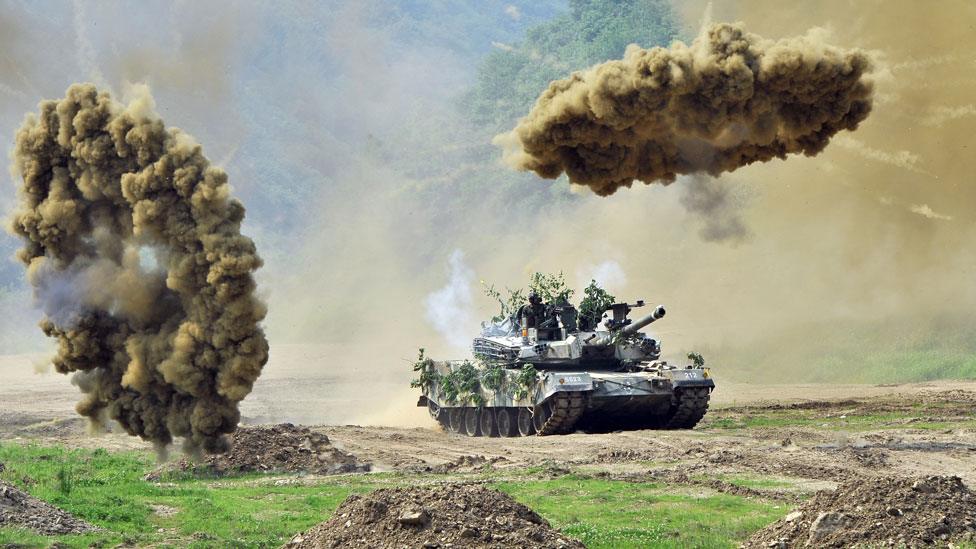
- Published9 November 2016
- Published10 September 2024
